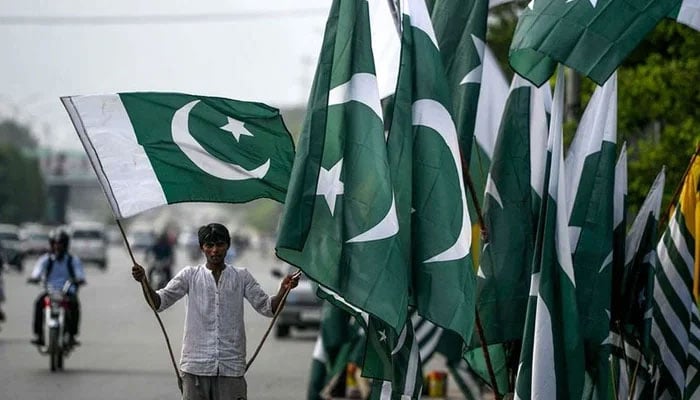Political polarisation, economic distress haunt Pakistan: HRCP
The report expresses deep concern over irreparable political divisions spilling over into public acts of arson and violence on May 9
LAHORE: Besides the ongoing political polarisation that persisted throughout 2023, leading to increased restrictions on civil and political rights, the year witnessed acute distress among ordinary citizens due to the cost-of-living crisis, culminating in widespread protests nationwide.
This has been revealed by the annual State of Human Rights 2023 report by the Human Rights Commission of Pakistan (HRCP), which has urgently called for economic justice and the protection of civil rights. Released on Wednesday, the report documents the human rights violations that occurred in the country during 2023.
The report expresses deep concern over irreparable political divisions spilling over into public acts of arson and violence on May 9, 2023, following the arrest of former prime minister Imran Khan. Subsequently, notes the report, there was a blatant disregard for the constitution as unelected forces tightened their grip on the country’s democratic structures, significantly reducing civic spaces.
The state’s response to the May 9 riots was to suppress dissent, resorting to measures such as resurrecting military courts to try civilians, engaging in enforced disappearances, ordering mass arrests, and allegedly orchestrating public disassociation from the PTI among many senior party leaders.
The report notes that the right to freedom of expression and assembly suffered during 2023 while the scheduled general elections were postponed well beyond the 90-day constitutional limit due to various reasons, including the necessity for new delimitations based on the recent census. Rule of law deteriorated significantly, with a record six-year high in fatalities related to terrorist attacks and counterterrorism operations, along with two militant attacks in Bajaur and Mastung, collectively resulting in at least 117 deaths.
The practice of extrajudicial killings persisted, while street crime and incidents of mob lynching surged. Similar to previous years, in 2023 too journalists, activists, and political workers were subjected to enforced disappearances across the country. The report notes that, in a display of strength however young Baloch women organised a long march from Turbat to Islamabad to protest against extrajudicial killings and enforced disappearances.
Among vulnerable groups, religious minorities reported an increasing atmosphere of fear, especially following an attack in Jaranwala, Punjab, where scores of churches and homes were torched and looted by mobs amid allegations of blasphemy against a Christian man. The HRCP also notes that, in response to the federal government’s decision to expel undocumented foreigners, Afghan nationals were in particular rounded up in police raids and sent to detention centres with little to no legal recourse.
Speaking at the report’s launch on Wednesday, Secretary-General of the HRCP Harris Khalique said that the 2023 economic crisis had “pushed tens of millions of ordinary citizens to the brink of desperation.” He also criticised the Commission of Inquiry into Enforced Disappearances, describing its role and performance as “disgraceful.”
HRCP Chairperson Asad Iqbal Butt emphasised the critical need for the state to fulfil people’s rights to education, livelihood, and health. Expressing concern over the low rate of trade unionisation, he noted that efforts to unionise workers were consistently met with harassment and intimidation. Vice-chair of HRCP Islamabad Nasreen Azhar remarked that religion continued to be ‘weaponised for political purposes.’
Concluding the press conference, co-chair Munizae Jahangir emphasised the importance of the state protecting the right to peaceful protest for all political parties and groups, highlighting that repressive laws passed during one government’s tenure could resurface to haunt them when in opposition.
-
 AI Copyright Battle: ByteDance To Curb Seedance 2.0 Amid Disney Lawsuit Warning
AI Copyright Battle: ByteDance To Curb Seedance 2.0 Amid Disney Lawsuit Warning -
 Savannah Guthrie In Tears As She Makes Desperate Plea To Mom's Kidnappers
Savannah Guthrie In Tears As She Makes Desperate Plea To Mom's Kidnappers -
 Canada’s Defence Industrial Strategy Targets 125,000 Jobs And Export Growth
Canada’s Defence Industrial Strategy Targets 125,000 Jobs And Export Growth -
 Tre Johnson, Former NFL Guard And Teacher, Passes Away At 54
Tre Johnson, Former NFL Guard And Teacher, Passes Away At 54 -
 Jerome Tang Calls Out Team After Embarrassing Home Defeat
Jerome Tang Calls Out Team After Embarrassing Home Defeat -
 Cynthia Erivo Addresses Bizarre Rumour About Her Relationship With Ariana Grande
Cynthia Erivo Addresses Bizarre Rumour About Her Relationship With Ariana Grande -
 Prince Harry, Meghan Markle Spotted Cosying Up At NBA All-Star Game
Prince Harry, Meghan Markle Spotted Cosying Up At NBA All-Star Game -
 Lady Gaga Explains How Fibromyalgia Lets Her 'connect With People Who Have It'
Lady Gaga Explains How Fibromyalgia Lets Her 'connect With People Who Have It' -
 Metro Detroit Weather Forecast: Is The Polar Vortex Coming Back?
Metro Detroit Weather Forecast: Is The Polar Vortex Coming Back? -
 Daniel Radcliffe Reveals Surprising Way Fatherhood Changed Him
Daniel Radcliffe Reveals Surprising Way Fatherhood Changed Him -
 ‘Disgraced’ Andrew At Risk Of Breaking Point As Epstein Scandal Continues
‘Disgraced’ Andrew At Risk Of Breaking Point As Epstein Scandal Continues -
 Alan Cumming Shares Plans With 2026 Bafta Film Awards
Alan Cumming Shares Plans With 2026 Bafta Film Awards -
 OpenClaw Founder Peter Steinberger Hired By OpenAI As AI Agent Race Heats Up
OpenClaw Founder Peter Steinberger Hired By OpenAI As AI Agent Race Heats Up -
 Kate Middleton's Reaction To Harry Stepping Back From Royal Duties Laid Bare
Kate Middleton's Reaction To Harry Stepping Back From Royal Duties Laid Bare -
 Rose Byrne Continues Winning Streak After Golden Globe Awards Victory
Rose Byrne Continues Winning Streak After Golden Globe Awards Victory -
 Ice Hockey Olympics Update: Canada Stays Unbeaten With Dominant Win Over France
Ice Hockey Olympics Update: Canada Stays Unbeaten With Dominant Win Over France




